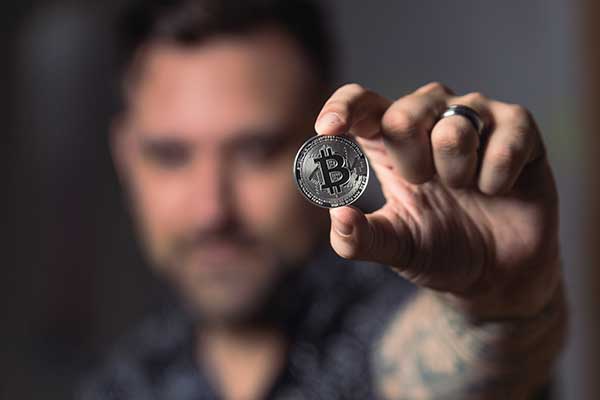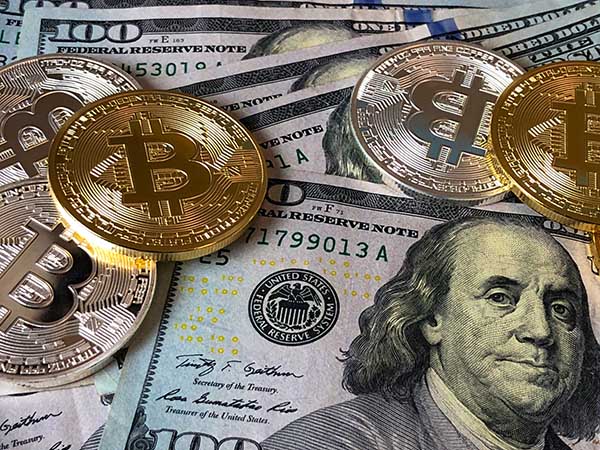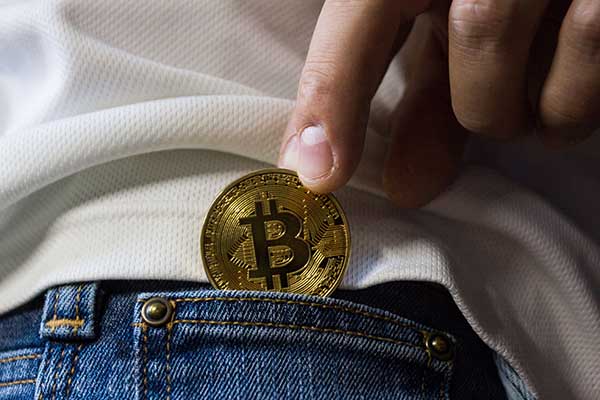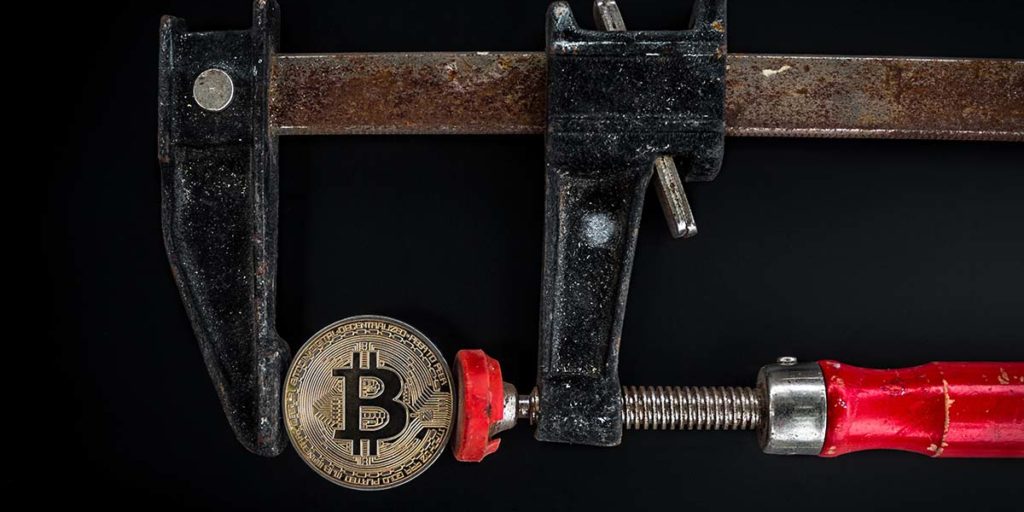The invention of Bitcoin started a blockchain revolution. In fact, many compare blockchain and cryptocurrency to the invention of the Internet in their potential to disrupt the field of finances, politics, and digital ownership.
At Wall Strategies, we care about the impact of cryptocurrencies on the financial system and your investment. While investing in Bitcoins is risky, overlooking this financial innovation is equally costly. Cryptocurrencies are here to stay. It is better to take the time to understand it and make it work for you than being left out on the crypto boom. To help you future-proof yourself and your portfolio, we will explore every aspect of Bitcoins in detail in this article.
What is Bitcoin?
Bitcoin is a decentralized cryptocurrency. In other words, it is independent digital cash that verifies and secures transactions with blockchain technology.
In the past, money is issued and supported by governments who not only print the currency but also guarantee its acceptance in each country. This government backing gives money authority and value. Financial institutions such as banks and credit card companies are also critical to the traditional monetary system. They help record the ownership of wealth by keeping track of how much money you have in your account and facilitating transactions. Additionally, they serve an important function of detecting and resolving fraudulent transactions.
In contract, Bitcoin functions without any of these authorities and support systems. Bitcoin is not issued by a government and its acceptance is not required by law. Bitcoin is created through a digital process called “mining”. New Bitcoins come into circulation after they are “mined” and no one organization or individual controls this process. Bitcoin’s acceptance is also completely voluntary. Stores have no obligations to accept Bitcoins but they must always accept government-issued currencies.

Moreover, Bitcoin doesn’t need banks to validate transactions and ensure security. Before Bitcoin, the biggest challenge facing digital currencies was to achieve security without a central party for record-keeping and maintenance. Bitcoin solved this problem with cryptography and blockchain technology. The record of how much Bitcoin you own is stored on the blockchain with a high degree of security.
Who invented Bitcoin?
The original concept of Bitcoin first appeared in a white paper in 2008, published under the alias of Satoshi Nakamoto. Since then, many people came forward to take credit for this paper. Unfortunately, even today we still cannot verify who Satoshi Nakamoto really is.
Is Bitcoin legal?
Bitcoins and Bitcoin transactions are perfectly legal as long as it is not used illegally for tax avoidance or money laundering.
How much is a Bitcoin worth?
The answer to this question can differ by thousands of dollars in just mere hours. Bitcoin’s price is extremely unpredictable but it also has created many Bitcoin millionaires who adopted the cryptocurrency during its early stage. A few years after its creation, Bitcoin’s value skyrocketed from a few pennies to nearly $20,000 in 2017. Then in 2018, the price plummeted to around $4,000 per Bitcoin.
The graph below shows the roller coaster ride of Bitcoin price and transaction volume from 2010 to 2019. As you can see, Bitcoin’s value is highly unstable, making it a risky investment. As of October 13th 2019, Bitcoin is trading at $8,349.
(Source: Coinbase)
What determines the price of Bitcoin?
It is important to note that unlike traditional investment options such as bonds, equities, or gold, Bitcoins have no intrinsic value.
Bitcoin’s price moves purely based on its supply and demand. When the demand for Bitcoin exceeds its supply, the price will rise. Comparably, the price falls when many people are selling their Bitcoins. Factors such as market perception and legislation can affect the supply and demand directly, moving the price of Bitcoins.
How many Bitcoins are there?
Currently, there are about 17 million Bitcoins in the world, with new coins being “mined” every day. However, the total supply of Bitcoin is fixed at 21 million. Because the supply of Bitcoin is capped, many argue that Bitcoin has a natural built-in deflation that will cause the price of Bitcoin to further increase in the future.
How can I buy Bitcoins?
With Bitcoin’s explosive popularity, there are more and more options to buy Bitcoins with varying degrees of anonymity and convenience.

Using a Bitcoin exchange
Buying Bitcoins on an exchange is the most common way of investing in Bitcoins. It is simple, just like buying stocks online. To buy Bitcoins, you need to first open an account with an online exchange such as Coinbase and verify your identity with government-issued IDs. Once your account is approved, you can then buy and sell Bitcoins in real-time with ease.
Buying from a P2P network
You can also purchase Bitcoins from other Bitcoin owners on peer-to-peer (P2P) networks. These networks are similar to eBay. When you buy Bitcoins on a P2P network, you first deposit money in an online seller’s account and the seller will then transfer the Bitcoins to you. As you can imagine, this process can be risky. It is important to buy from trustworthy vendors to avoid fraud. The upside of using P2P networks is that the transactions can are private and anonymous in comparison to buying from a Bitcoin exchange.
Depositing into Bitcoin ATMs
Bitcoin ATMs used to be novelties only found in major cities but they are becoming more and more common. Perhaps, you have seen one of them at your local malls. A Bitcoin ATM works similarly like a regular ATM. Instead of depositing cash in your bank account, your cash deposit is converted to Bitcoins and sent to your Bitcoin wallet. Of course, you can also sell Bitcoins to withdraw cash from these machines. Bitcoin ATMs are convenient for small transactions but they charge higher transaction fees just like many ATMs do.
Where do I keep my precious Bitcoins?
Storage of cryptocurrency is fascinating. Like traditional currency, Bitcoins are stored in a “wallet”. However, this wallet is different from the one in your pocket. A Bitcoin wallet is basically computer codes. It comprises two sequences of numbers: one public key and one private key.
You can think of the public key as your email address. People can send money to you by typing in your public key. The private key, on the other hand, is like your email password and should be kept protected. Only with the private key can you spend the Bitcoin in your wallet, just like only you can send emails from your email account. If you lose your private key, however, all your Bitcoins are gone forever, because there is no third-party that can recover your account. These two sequences, aka the Bitcoin wallet, are the essence of your Bitcoin ownership.

What are hot and cold wallets?
Because Bitcoins are lost forever if you lose your private key, choosing a secure place to keep your wallet is highly critical. There are two ways to keep your Bitcoin wallet: a hot wallet and a cold wallet. Hot wallet storage is connected to the internet. Online Bitcoin exchanges are considered hot wallets. The internet connectivity makes spending Bitcoin easier but it also exposes your accounts to hacking. Most hackings in Bitcoin history happened to funds stored in hot wallets. Thus, it is not a great idea to store a large amount of Bitcoin in a hot wallet.
In contrast, cold wallet storage does not connect to the internet. Instead, your public and private keys are kept on a USB drive or even a piece of paper. These wallets are more secure because no one can access this information remotely. However, cold wallets are cumbersome to use for regular transactions. Just imagine typing the following private key every time you buy a cup of coffee:
E9873D79C6D87DC0FB6A5778633389F4453213303DA61F20BD67FC233AA33262
Where can I use Bitcoin?
In 2010, a computer programmer posted a request to purchase two large pizzas with 10,000 Bitcoins. That was the first known Bitcoin transaction and the most fascinating one. At the time, only a few people had heard of Bitcoin and no one accepted it as payment. Hours later, another programmer saw his post and took him up on this offer. He ordered two large pizzas for the poster and received the Bitcoins in exchange.
It is mind-blowing to know that these 10,000 Bitcoins are now worth well over a hundred million dollars. At the height of Bitcoin, these two pizzas were worth more than $200 million. These pizzas were without a doubt the most meal in history.
Since then, the adoption of Bitcoin has grown substantially. Now, spending Bitcoins is convenient and the currency is widely accepted by online and physical merchants. Some of the biggest companies in the world now that now accept Bitcoins include Microsoft, AT&T, Virgin Airline, and Expedia.
In addition, accepting Bitcoin is becoming increasingly easy for small businesses. With the help of Bitcoin payment services and companies, even mom and pop shops can start accepting Bitcoins.
Is Bitcoin here to stay?
Originally considered as a gimmicky invention, Bitcoin has gained recognition for its technological breakthrough. Unlike investment bubbles in history, Bitcoin is built on revolutionary technology, the blockchain, that is disrupting every industry in the world. While the future of Bitcoin as a currency might be uncertain, cryptocurrencies and the blockchain technology are here to stay and will probably change the way the financial world functions.
The brink of a technology breakthrough
In all likeliness, we are currently in a technological revolution similar to the industrial revolution or the birth of the internet. Blockchain has promised to increase the efficiency and security of many fields including finance.
As we stand at the brink of a breakthrough, the best way to future-proof your portfolio and your life is to gain a deeper understanding of cryptocurrencies and the blockchain applications coming into your life. If you want to learn more about the basics of blockchain technology and why it has the potentials to change the world, you can read this article on the blockchain here.




